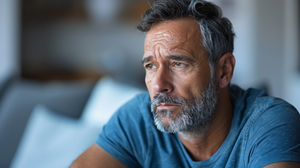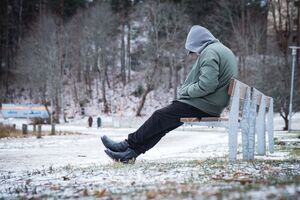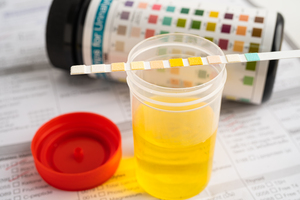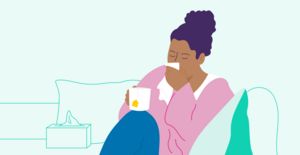Rosacea Treatment
Does your face easily flush with heat and embarrassment, or even for no apparent reason? Do you have nose pimples that don’t quite feel like ordinary acne? Does the skin of your cheeks feel tender, or are your eyelids red and swollen? You’re probably eager to figure out what is going on with your skin.
You might have rosacea, which means you need to find a dermatologist to get a diagnosis and a targeted rosacea treatment plan.
What is rosacea?
The American Academy of Dermatology Association (AADA) defines rosacea (pronounced rose-AY-sha) as a common skin disease that “often begins with a tendency to blush or flush more easily than other people.” This facial redness can last longer than your embarrassment, and while it usually begins in the nose and cheeks, it may spread to the chin and forehead--and even to ears, backs, and chests.
Rosacea symptoms can appear differently in various people, coming and going and fluctuating in intensity. According to MedlinePlus, the four subtypes of this condition are:
- Erythematotelangiectatic rosacea, which causes warmth (flushing), redness, and clusters of visible blood vessels
- Papulopustular rosacea, which causes swelling, redness, and acne-like bumps with pus
- Phymatous rosacea, in which the facial skin thickens and develops a bumpy texture. Over time, when untreated, the nose can become enlarged and bulbous.
- Ocular rosacea, which causes eye irritation, inflammation, and redness. The eyelids can swell, and patients may develop bumps that look like styes. The condition can also cause dryness and affect vision.
- Many rosacea sufferers experience stinging, itching, and burning in the areas impacted by their condition.
Who is likely to get rosacea?
Anyone can potentially get rosacea, but according to MedlinePlus your odds increase if you:
- Sunburn easily
- Have blonde hair, fair skin, and blue eyes
- Have Celtic or Scandinavian ancestry
- Have a family history of rosacea
- Are between 30 and 50 years old
- Have a history of severe acne
- Smoke
Also, while women are more likely to get rosacea than men, men are more likely to develop severe rosacea.
What causes rosacea?
Although researchers have not yet discovered what causes rosacea, they have found clues, such as the fact that rosacea runs in families, noted MedlinePlus. This suggests that rosacea may be genetic, or at least have a genetic component.
Other theories about rosacea causes according to MedlinePlus involve:
- Intestinal bugs: H pylori, which can cause infections in the immune system, is common among rosacea patients, although not present in all.
- The immune system: When individuals with acne-type rosacea encounter the bacillus oleronius bacteria, most experience an overreaction of the immune system, though it is unknown if the reaction can cause the condition.
- Protein: Some researchers are studying cathelicidin, a protein meant to protect skin from infection. In individuals who process the protein differently, cathelicidin causes swelling and redness.
- Mites: Demodex is a type of mite that lives on everyone’s skin, preferring our nose and cheeks. Studies have found that people with rosacea have mites on their skin — although so do many people without rosacea.
What are the signs and symptoms of rosacea?
The Mayo Clinic lists rosacea symptoms and signs as:
- Facial flushing or blushing that is most intense in the center of your face. Most visually noticeable on pale skin tones.
- A hot, burning sensation in the skin of the affected area. May also feel tender.
- Swollen bumps on the face and nose pimples that resemble acne. These may contain pus.
- Small, broken blood vessels of the cheeks and nose become visible on the skin (spider veins).
- Over time, rosacea can cause the skin of the nose to become thick and bumpy so that it appears bulbous (rhinophyma). This is observed more frequently in men than women.
- Dry, irritated, and swollen eyes and eyelids. For some, eye irritation may occur before skin symptoms.
How is rosacea diagnosed?
If you suspect you have rosacea, you should see a dermatologist. While there are no medical tests for the condition, a dermatologist will examine your skin and ask questions about your symptoms. Other conditions can resemble rosacea, such as lupus and allergic dermatitis, so your doctor will perform lab tests to rule those out before making a rosacea diagnosis.
How is rosacea treated?
If you are diagnosed with rosacea, your dermatologist will advise you on rosacea treatment and management. Although there isn’t a cure, there are treatments for rosacea that can improve rosacea symptoms, ease discomfort, and minimize or possibly eliminate symptoms.
Johns Hopkins Medicine lists the most common kinds of rosacea treatment as:
- Prescription creams or lotions
- Topical and oral antibiotics
- Dermabrasion
- Laser therapy
- Glycolic acid peels
- Electrosurgery
Some people will also need to avoid foods that dilate blood vessels in the skin, such as spicy food, alcohol, and caffeine.
How do I cover rosacea with makeup?
The National Rosacea Society offers a wide range of helpful makeup tips for people with rosacea:
- Start with a clean, moisturized face, and always treat your skin gently to avoid irritation.
- Try to minimize the number of products and ingredients you apply to your skin so that irritation is less likely. It’s also a good idea to test out new products in a less noticeable area before applying them to your face.
- Use a green-tinted base or primer to cancel out red tones. Find one with sun protection to shield skin from UVA/UVB rays, which can aggravate rosacea.
- Use oil-free foundation and concealer and apply them with antibacterial brushes instead of a sponge or your fingers to minimize irritation. Clean brushes between uses.
- Mineral powder makeup may be a good choice for you, as it can provide good coverage without irritation.
- If you have moderate to severe rosacea, you may want to try cover-corrective makeup.
- Use gentle, allergy- and ophthalmologist-tested eye makeup designed for sensitive eyes. Avoid long wear and waterproof products that require lots of scrubbing or strong cleansers to remove.
Can you prevent rosacea?
According to the American Academy of Family Physicians, rosacea prevention may be possible for you, but it will likely take some trial and error to decide what works best for your skin. Keeping a diary of what you eat, drink, the medications you take, your stress level, the weather, and other factors and how your skin is throughout can help you figure out what your rosacea triggers are.
The American Academy of Family Physicians lists the following as common rosacea triggers:
- Direct or indirect heat, such as hot baths or saunas
- Certain foods, especially spicy foods
- Menopause
- Harsh skincare products
- Exercise or sweating
- Severe weather conditions, such as freezing temperatures, strong winds, and the hottest days of summer
- Stress or anxiety
- Alcohol
- Caffeine
According to the American Academy of Family Physicians, some prevention methods seem to work well for most people with rosacea:
- Wear sunscreen with UVA/UVB protection in SPF 15 or higher
- Adhere to all instructions for medications prescribed by your doctor.
- Minimize stress if possible
- Avoid extremes of temperature
Is there a cure for rosacea?
Rosacea is widely studied and researched in dermatology, and rosacea treatment can be very effective, but there is no cure. This chronic condition, which the American Acne & Rosacea Society reports impacts 14 million people in the United States, is characterized by intermittent flare-ups.
With help from your dermatologist, you can create a treatment plan that manages your rosacea so it minimizes the effect it has on your life. Prescription oral and topical medications, dermatological procedures, and lifestyle changes to avoid triggers can prevent rosacea from getting worse while reducing or eliminating symptoms and visible signs.
Find Rosacea Treatment near you
- Alabama
- Alaska
- Arizona
- Arkansas
- California
- Colorado
- Connecticut
- Delaware
- Florida
- Georgia
- Hawaii
- Idaho
- Illinois
- Indiana
- Iowa
- Kansas
- Kentucky
- Louisiana
- Maine
- Maryland
- Massachusetts
- Michigan
- Minnesota
- Mississippi
- Missouri
- Montana
- Nebraska
- Nevada
- New Hampshire
- New Jersey
- New Mexico
- New York
- North Carolina
- North Dakota
- Ohio
- Oklahoma
- Oregon
- Pennsylvania
- Rhode Island
- South Carolina
- South Dakota
- Tennessee
- Texas
- Utah
- Vermont
- Virginia
- Washington
- Washington DC
- West Virginia
- Wisconsin
- Wyoming
Rosacea Treatment FAQs
What is rosacea?
According to MedlinePlus, rosacea is a chronic, inflammatory, dermatological condition that causes reddened, bumpy skin, primarily on the nose and cheeks. Symptoms can come and go and may flare up in response to triggers such as getting overheated or experiencing emotional stress and anxiety.
What does rosacea look like?
Rosacea causes facial flushing and blushes, and acne-like breakouts that can feel warm and itchy like a rash, or may contain pus, reports MedlinePlus. Skin can swell and thicken in some types of rosacea, with bumps and nose pimples that can enlarge the nose over time. Rosacea can also cause eye redness and irritation.
What causes rosacea?
Although it is unknown what causes rosacea, it is believed to have a genetic component as it runs in families, notes MedlinePlus. Other theories link rosacea causes to overreactions of the immune system, intestinal bugs, and unusual reactions to common skin proteins or mites.
How to treat rosacea
As rosacea is a chronic condition, meaning it cannot be cured, the goal of rosacea treatment is to control and improve symptoms and your quality of life. Individual cases can vary widely, so your dermatologist will tailor your treatment plan to you. Treatment of rosacea involves a blend of prescription medications and self-care efforts like avoiding triggers and wearing sunscreen. Improvements tend to be gradual, taking months to see results.
How to get rid of red spots on the face
Common topical agents prescribed to treat the flushing, redness, and red spots on the face that typify rosacea are ointments, gels, and creams containing antiparasitics, antibiotics, or vasoconstrictors to narrow blood vessels, reports, the American Academy of Family Physicians. Retinoids may be prescribed in more severe cases.
Are there home remedies for rosacea?
The best home remedies for rosacea are to take good care of your skin by using simple, dermatologist-approved facial products, and to handle your skin gently, notes the American Academy of Family Physicians. Don’t use harsh exfoliants or scrub roughly. Let your skin breathe when you don’t need to put on makeup and try not to get overheated. Be sure to wear sunscreen whenever you go out in the sun.
Where can I get rosacea removed/treated?
The best place to have your rosacea treated is a doctor’s office. Dermatology is the medical specialty that focuses on skin, if you have, or suspect you have rosacea, you should see a dermatologist
Solv can help you find quality, same-day, dermatology care for rosacea treatment. From specialty care to urgent care to pediatric urgent care, we can help you find fast, expert, medical care near you.
Solv has strict sourcing guidelines and relies on peer-reviewed studies, academic research institutions, and medical associations. We avoid using tertiary references.
Everyday Healthcare, Simplified
Expert advice to help you live your best life








